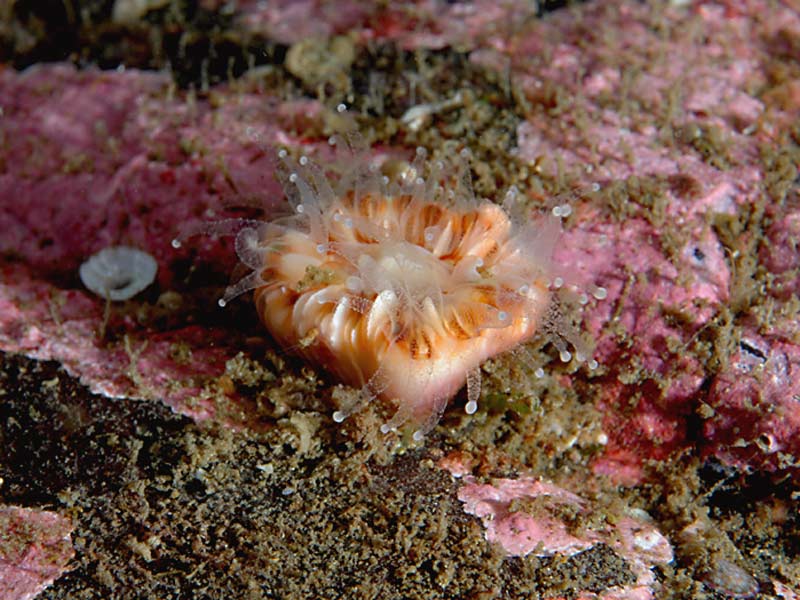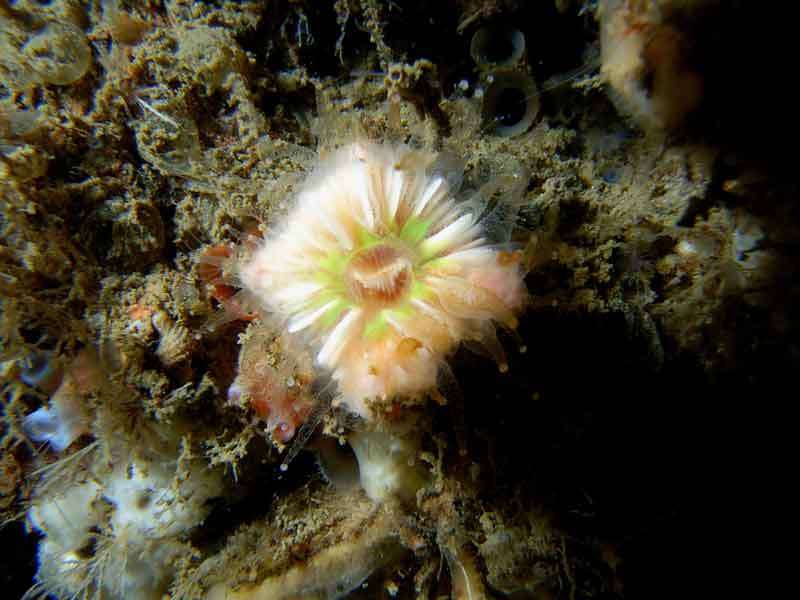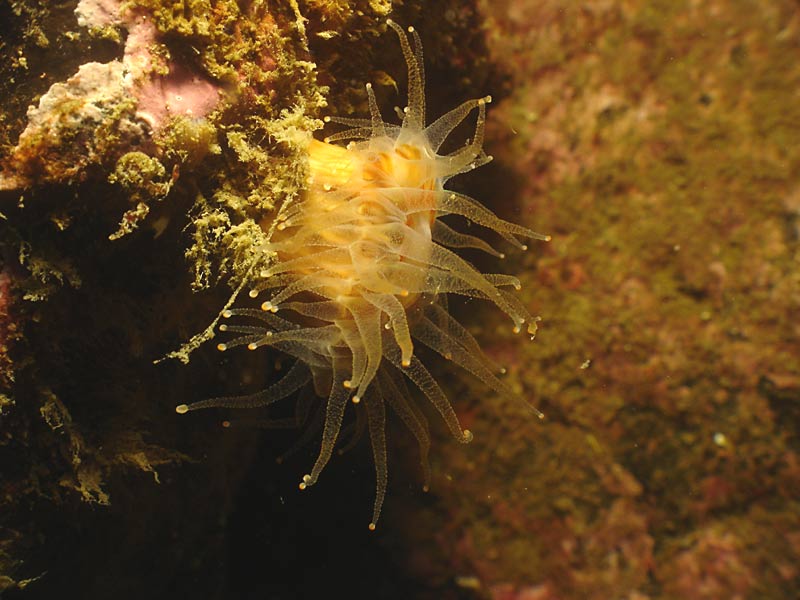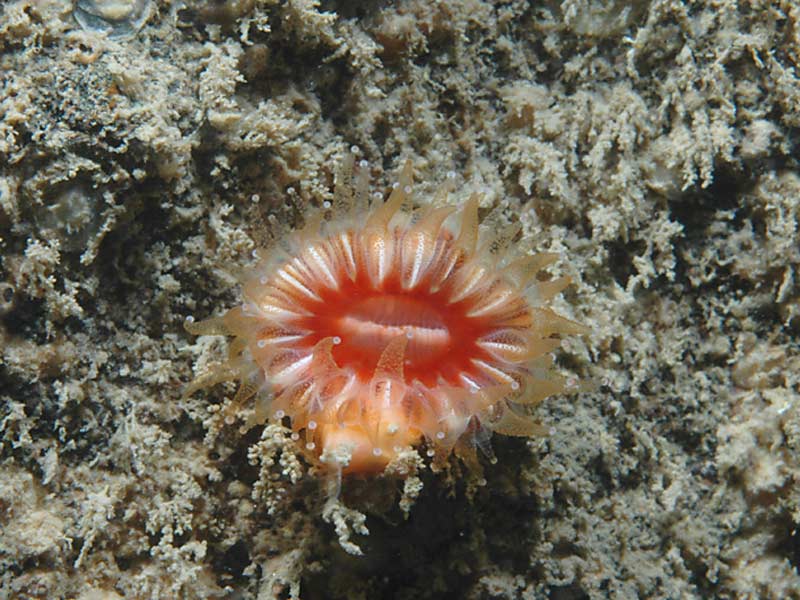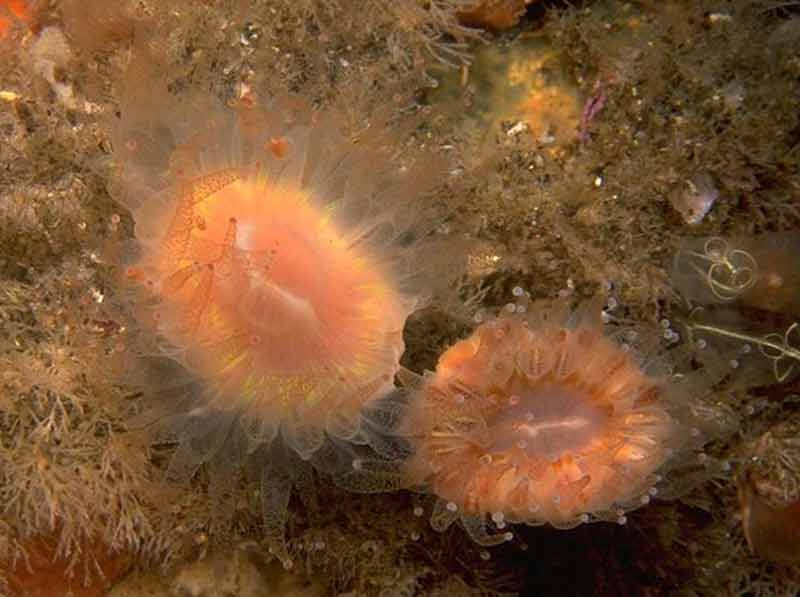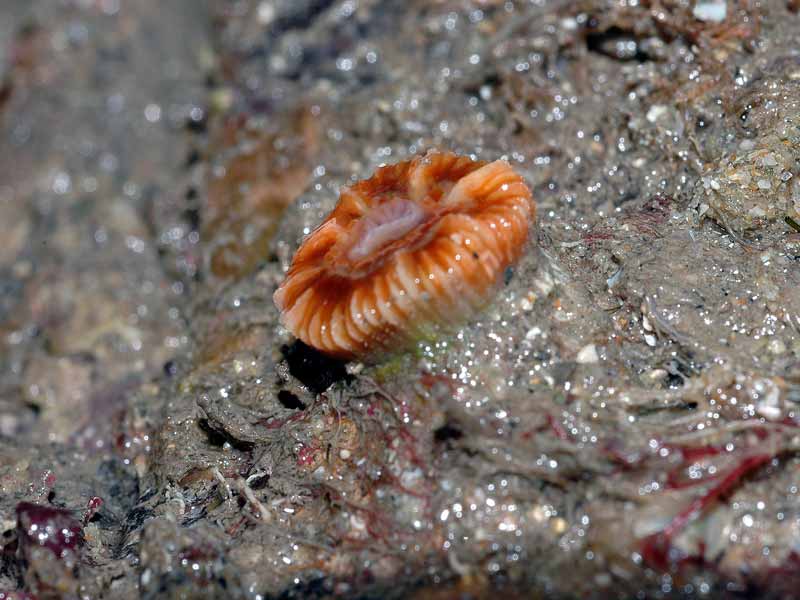Devonshire cup coral (Caryophyllia (Caryophyllia) smithii)
Distribution data supplied by the Ocean Biodiversity Information System (OBIS). To interrogate UK data visit the NBN Atlas.Map Help
| Researched by | Paul Gregory | Refereed by | Admin |
| Authority | Stokes & Broderip, 1828 | ||
| Other common names | - | Synonyms | Caryophyllia claves , Paracyathus taxilianus , Paracyathus thulensis , Paracyathus pteropus , Caryophyllia claves , Paracyathus taxilianus Stokes & Broderip, 1828, Paracyathus thulensis Stokes & Broderip, 1828, Paracyathus pteropus Stokes & Broderip, 1828, Caryophyllia smithii |
Summary
Description
A solitary hard coral, up to 2.5 cm in diameter, very rarely occurring in clusters of two to four. The polyp has less than 80 translucent tentacles with small but distinct terminal knobs. The calcified cup-shaped skeleton (corallum) has smooth-edged projecting septa and is usually broader than high. Colour is very variable ranging from white, pink, orange, red to green. The disc usually has a contrasting zigzag ring pattern around the mouth.
Recorded distribution in Britain and Ireland
Found from Shetland, north eastern England, the south west, Wales, Ireland and north western Scotland.Global distribution
Abundant around south west Europe and the Mediterranean.Habitat
Sublittoral on rocks or shell and artificial structures to a depth of at least 200 m. Can sometimes be found on the shore in shaded places and deep pools.Depth range
-Identifying features
- Stony solitary coral with a calcareous exoskeleton.
- Up to 2.5 cm in diameter and height with less than 80 slender tapered translucent tentacles and each with a prominent spherical swelling at the terminal end.
- Calcified cup-shaped corallum has a smooth-edged projecting septa.
Additional information
Manuel (1988) states that the Devonshire cup coral has two forms; a shallow water form (Caryophyllia smithii var. smithii) that can be found in waters up to 100 m deep and a deep water form (Caryophyllia smithii var. clavus) that is found in water >50-1000 m deep. The shape of the corallum is distinctly different between the two forms, the deep water form being smaller with a narrow base, but the two forms are otherwise similar in general structure (Manuel, 1988).
Caryophyllia inornata is very similar and co-occurs in some locations. Young specimens of Caryophyllia smithii are usually six-rayed and may be virtually indistinguishable from Caryophyllia inornata (Manuel, 1983).
Listed by
- none -
Bibliography
Bell, J.J. & Turner, J.R., 2000. Factors influencing the density and morphometrics of the cup coral Caryophyllia smithii in Lough Hyne. Journal of the Marine Biological Association of the United Kingdom, 80, 437-441. DOI https://dx.doi.org/10.1017/S0025315400002137
Bell, J.J., 2002. Morphological responses of a cup coral to environmental gradients. Sarsia, 87, 319-330. DOI https://doi.org/10.1080/00364820260400825
Fish, J.D. & Fish, S., 1996. A student's guide to the seashore. Cambridge: Cambridge University Press.
Gibson, R., Hextall, B. & Rogers, A., 2001. Photographic guide to the sea and seashore life of Britain and north-west Europe. Oxford: Oxford University Press.
Hayward, P., Nelson-Smith, T. & Shields, C. 1996. Collins pocket guide. Sea shore of Britain and northern Europe. London: HarperCollins.
Hayward, P.J. & Ryland, J.S. (ed.) 1995b. Handbook of the marine fauna of North-West Europe. Oxford: Oxford University Press.
Hiscock, K. & Howlett, R. 1976. The ecology of Caryophyllia smithii Stokes & Broderip on south-western coasts of the British Isles. In Underwater Research (ed. E.A. Drew, J.N. Lythgoe & J.D. Woods), pp. 319-344. London: Academic Press.
Howson, C.M. & Picton, B.E. ed., 1999. The species directory of the marine fauna and flora of the British Isles and surrounding seas. CD-ROM Edition. Ulster Museum and The Marine Conservation Society, Belfast and Ross-on-Wye., Belfast: Ulster Museum. [Ulster Museum publication no. 280.]
Howson, C.M. & Picton, B.E., 1997. The species directory of the marine fauna and flora of the British Isles and surrounding seas. Belfast: Ulster Museum. [Ulster Museum publication, no. 276.]
Manuel, R.L., 1983. The Anthozoa of the British Isles - a colour guide, 2nd edn. Ross-on-Wye: Marine Conservation Society.
Manuel, R.L., 1988. British Anthozoa. Synopses of the British Fauna (New Series) (ed. D.M. Kermack & R.S.K. Barnes). The Linnean Society of London [Synopses of the British Fauna No. 18.]. DOI https://doi.org/10.1002/iroh.19810660505
Tendal, O.S. & Nielsen, C., 1997. The Devonshire cup-coral (Caryophyllia smithii) - New to the Danish fauna Flora og Fauna, 103, 7-9.
Tranter, P.R.G., Nicholson, D.N. & Kinchington, D., 1982. A description of spawning and post-gastrula development of the cool temperate coral, Caryophyllia smithi. Journal of the Marine Biological Association of the United Kingdom, 62, 845-854. DOI https://doi.org/10.1017/s0025315400044106
Wilson, J.B., 1975. The distribution of the coral Caryophyllia smithii S. & B. on the Scottish continental shelf. Journal of the Marine Biological Association of the United Kingdom, 55, 611-625.
Wilson, J.B., 1976. Attachment of the coral Caryophyllia smithii S. & B. to tubes of the polychaete Ditrupa arietina (Müller) and other substrates. Journal of the Marine Biological Association of the United Kingdom, 56, 291-303.
Datasets
Centre for Environmental Data and Recording, 2018. Ulster Museum Marine Surveys of Northern Ireland Coastal Waters. Occurrence dataset https://www.nmni.com/CEDaR/CEDaR-Centre-for-Environmental-Data-and-Recording.aspx accessed via NBNAtlas.org on 2018-09-25.
Environmental Records Information Centre North East, 2018. ERIC NE Combined dataset to 2017. Occurrence dataset: http://www.ericnortheast.org.ukl accessed via NBNAtlas.org on 2018-09-38
Manx Biological Recording Partnership, 2022. Isle of Man historical wildlife records 1990 to 1994. Occurrence dataset:https://doi.org/10.15468/aru16v accessed via GBIF.org on 2024-09-27.
NBN (National Biodiversity Network) Atlas. Available from: https://www.nbnatlas.org.
OBIS (Ocean Biodiversity Information System), 2025. Global map of species distribution using gridded data. Available from: Ocean Biogeographic Information System. www.iobis.org. Accessed: 2025-08-08
Citation
This review can be cited as:
Last Updated: 17/04/2008

